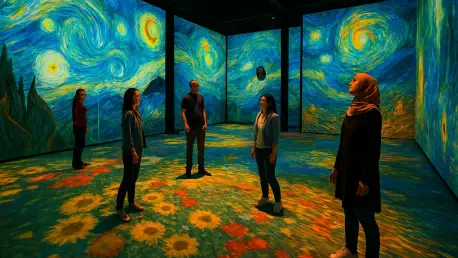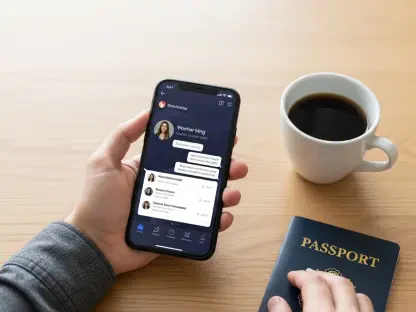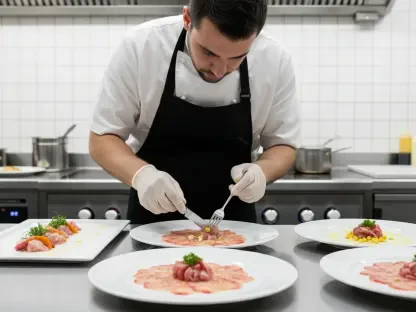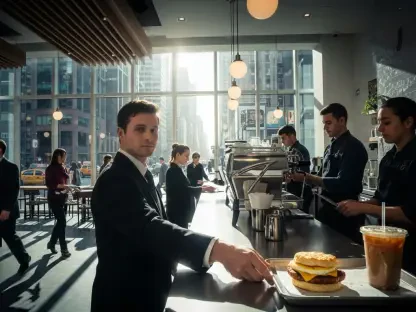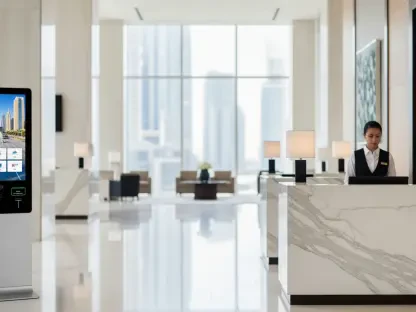Imagine stepping into a museum where history unfolds around you, not just as static displays, but as a living, breathing narrative that captivates every sense, drawing you into a world where the past feels vividly present. This is the power of immersive experiences, a rapidly growing industry that transforms spaces into emotionally charged environments for brands, cultural institutions, and visitor attractions. The sector has gained significant traction in recent years, driven by a hunger for deeper connections in an increasingly digital world, where audiences crave memorable, interactive encounters.
At the forefront of this transformation stands Populate Group, a pioneering company founded by industry veteran Joshua Murton. With headquarters in London and Dubai, and operational bases in Riyadh and Barcelona, Populate Group is strategically positioned to influence key markets in the UK and Middle East. The company’s vision is clear: to redefine how immersive environments are created by seamlessly blending architectural precision, cutting-edge digital technology, and innovative content design.
This mission sets Populate Group apart in an industry often challenged by fragmented approaches. By focusing on both temporary pop-up installations and permanent brand homes, the company aims to deliver experiences that resonate on a profound level while meeting the operational demands of large-scale projects. This introduction sets the stage for exploring how Populate Group is shaping the future of experiential design in two dynamic regions.
The Rise of Immersive Experiences: Industry Trends and Market Insights
Key Trends Driving the Immersive Experience Sector
The immersive experience sector is witnessing a global surge in demand for sophisticated environments that captivate audiences on a grand scale. From temporary exhibitions at major events to permanent installations in museums and brand spaces, there is a clear shift toward creating spaces that evoke strong emotional responses. This trend reflects a broader cultural move toward experiences over material goods, as consumers prioritize meaningful interactions.
Technological advancements play a pivotal role in this evolution, with tools like augmented reality, virtual reality, and interactive projections becoming standard in delivering impactful content. Alongside technology, changing consumer expectations are pushing brands and institutions to craft experiences that are not only visually stunning but also operationally seamless. The integration of live events with the professionalism of construction practices is becoming a benchmark for quality in the sector.
Another notable trend is the rise of permanent brand environments, where companies establish dedicated spaces to tell their stories in immersive ways. This blending of storytelling with physical spaces requires a balance of creativity and technical expertise, a challenge that many in the industry are racing to meet. These developments signal a maturing market that values both innovation and reliability.
Market Growth and Future Projections
The immersive experience industry in the UK and Middle East is experiencing robust growth, with market size expanding as global brands and cultural institutions invest heavily in experiential design. Recent estimates suggest that the sector in these regions could see double-digit growth annually from 2025 to 2027, fueled by increased budgets for visitor attractions and corporate branding initiatives. This upward trajectory underscores the economic potential of immersive spaces as a driver of engagement.
Investment trends reveal a significant commitment from major players, with multinational corporations and government-backed cultural projects allocating substantial resources to create standout experiences. In the Middle East, for instance, ambitious initiatives tied to tourism and national branding are accelerating demand for world-class installations. The UK, meanwhile, remains a hub for cutting-edge design, with London serving as a testing ground for innovative concepts.
Looking ahead, the sector is poised for further evolution as emerging technologies like artificial intelligence and advanced haptics become more accessible. Rising client expectations for personalized and adaptive experiences will likely shape project scopes, pushing companies to innovate continuously. This forward-looking perspective highlights a vibrant future where immersive environments become integral to how stories are told and brands are perceived.
Challenges in Delivering Immersive Experiences
The creation of large-scale immersive experiences often involves navigating a complex landscape of creative and technical demands. Balancing artistic vision with the reliability of systems like audio-visual setups or structural designs can prove daunting, especially when projects span multiple regions with varying standards. This duality requires a deep understanding of both design principles and engineering constraints.
Additional challenges include managing the high costs associated with innovation and ensuring compliance with diverse regulatory frameworks in the UK and Middle East. Clients increasingly demand future-proof solutions that can adapt to technological advancements, adding pressure to already tight budgets and timelines. These obstacles can risk project delays or compromises in quality if not addressed strategically.
To mitigate such risks, solutions like end-to-end project delivery are gaining traction, ensuring a cohesive process from concept to completion. Populate Group, for instance, adopts this approach by fostering strategic partnerships with technology providers and local experts to streamline execution. Such methods help address operational hurdles while maintaining a focus on delivering impactful and lasting experiences.
Regulatory and Operational Standards in the Immersive Sector
The regulatory landscape for immersive experiences in the UK and Middle East presents a multifaceted challenge, with safety standards, intellectual property protections, and regional compliance requirements shaping project frameworks. In the UK, stringent health and safety protocols must be adhered to, while in the Middle East, cultural sensitivities and local laws often influence design and content choices. Navigating these rules demands meticulous planning and expertise.
Aligning projects with both local regulations and global best practices is essential for credibility and success. This includes ensuring that installations meet fire safety codes, accessibility guidelines, and data protection laws, particularly when digital elements are involved. Failure to comply can result in costly setbacks or reputational damage, making regulatory diligence a priority for industry players.
Populate Group distinguishes itself by embedding compliance into its operational strategy, prioritizing secure and legally sound experiences. By working closely with regional authorities and international consultants, the company ensures that its projects uphold the highest standards. This commitment not only mitigates risks but also builds trust with clients seeking reliable partners in a complex field.
Populate Group’s Strategic Growth and Industry Leadership
Since its launch in the summer of this year, Populate Group has made remarkable strides in establishing itself as a leader in the immersive experience sector. The company has enhanced its project delivery capabilities through strategic platform acquisitions, enabling faster and more efficient execution of complex installations. Successful projects in the UK, Riyadh, and Dubai demonstrate its ability to operate effectively across diverse markets.
Key partnerships in the USA and Asia have further expanded Populate Group’s global footprint, while major contracts with leading clients underscore its growing influence. These collaborations provide access to cutting-edge technologies and insights into emerging trends, strengthening the company’s competitive edge. Such achievements reflect a deliberate focus on scaling operations without compromising quality.
The expertise of Populate Group’s leadership team is a critical asset, with founder Joshua Murton bringing experience from high-profile projects like Visa’s pavilion at major international events. Supported by Chief Growth Officer Charlie Hepburn, Executive Creative Director Tobie Anderson, and Head of Client Services Tony McKenzie, the team combines skills in events, technology, and client relations. This diverse talent pool drives the company’s mission to deliver unparalleled immersive environments.
The Future of Immersive Experiences with Populate Group
The trajectory of the immersive experience industry points toward a future shaped by emerging technologies such as machine learning and immersive audio systems, which promise to deepen audience engagement. Potential disruptors, including shifts in virtual interaction platforms, could redefine how physical and digital spaces converge. Clients are increasingly seeking personalized experiences that adapt in real time, setting a new standard for innovation.
Populate Group is well-positioned to influence this future through its “ecosystem of expertise,” which integrates storytelling with technical precision. By fostering a collaborative approach among designers, engineers, and content creators, the company ensures that projects remain both imaginative and feasible. This balance is crucial as the industry navigates evolving demands for impactful and scalable solutions.
Global economic conditions, cultural trends, and technological breakthroughs will continue to shape the growth of immersive environments in the UK, Middle East, and beyond. As budgets for experiential marketing grow and tourism initiatives expand, companies like Populate Group will play a pivotal role in meeting heightened expectations. This dynamic landscape offers vast opportunities for those ready to push boundaries while maintaining operational excellence.
Conclusion: Populate Group as a Transformative Force
Looking back, Populate Group has carved a distinctive path in the immersive experience sector by championing a blend of creativity and operational rigor. Its rapid ascent since launching earlier this year reflects a keen ability to address industry gaps, delivering projects that resonate deeply with audiences across the UK and Middle East. The strategic moves, from partnerships to platform acquisitions, showcase a blueprint for success in a competitive field.
For stakeholders and clients, the next step involves embracing immersive experiences as a cornerstone of brand engagement and cultural storytelling. Investing in partnerships with innovators like Populate Group could unlock new avenues for connecting with audiences in meaningful ways. This approach promises to amplify impact, especially as demand for such environments continues to soar.
Beyond immediate gains, consideration of long-term trends—such as integrating sustainable practices into experiential design—offers a forward-thinking perspective. As the industry evolves, aligning with companies that prioritize both innovation and responsibility becomes essential. This focus on future-ready solutions ensures that immersive spaces will not only captivate but also endure in an ever-changing global landscape.
